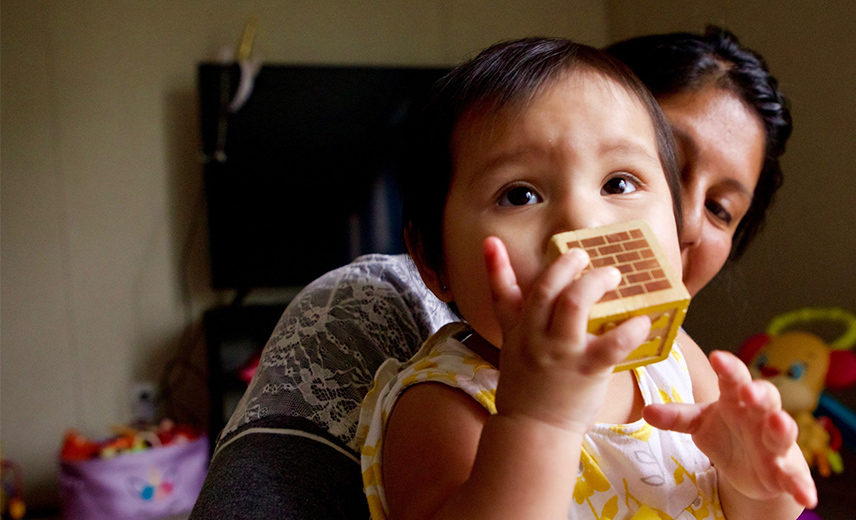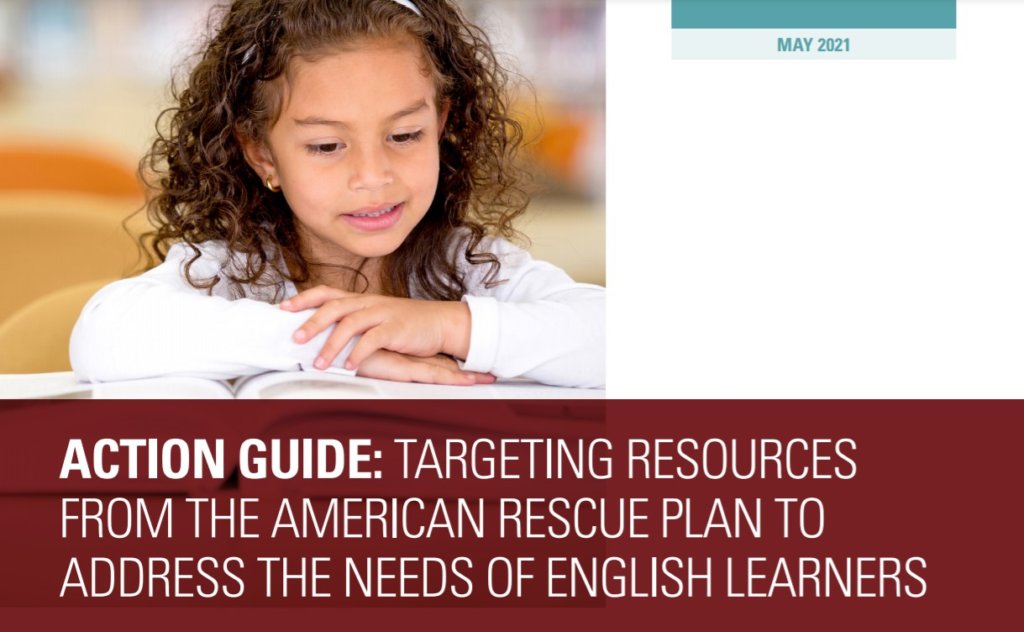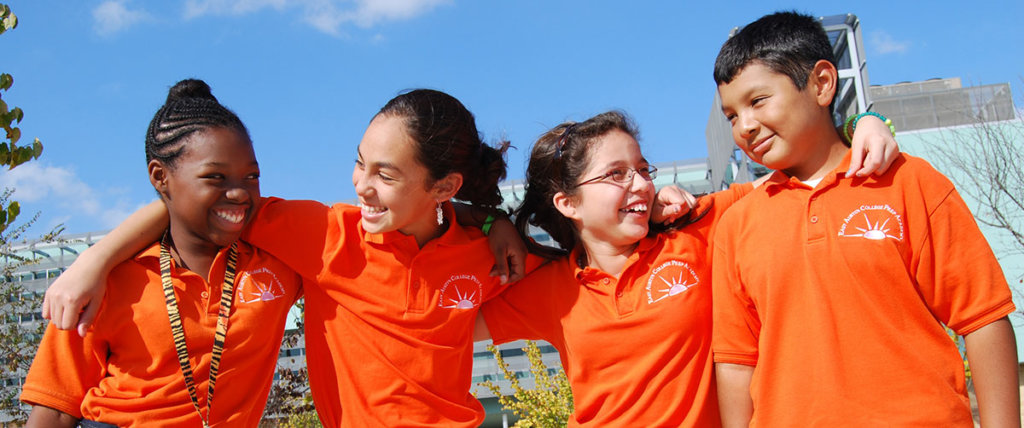Webinar: UnidosUS, Abriendo Puertas, and BSP Research Discuss the Findings of 2022 Latino Family Voices Survey
More than a year out from the height of the COVID-19 pandemic, the economy, access to education, healthcare, and nutrition, are all big concerns for Latino families with small children or babies on the way, shows a fall survey by UnidosUS, Abriendo Puertas/Opening Doors, and BSP Research. But in the wake of mass shootings like the one in Uvalde, Texas, and incidences of racism and xenophobia that spiked during the Trump administration and persist today, so too are concerns for children’s safety and a family’s sense of belonging.
“We believe that this information can really serve as a resource not only for advocates, but also for policy makers,” UnidosUS Education Policy Director Amalia Chamorro said during an October 25 webinar UnidosUS co-sponsored with the Latino parent leadership organization Abriendo Puertas/Opening Doors (AP/OD).
The webinar and the corresponding full report, which is to be released in January 2023, were conducted as part of the initial phase of the Latino Infant Initiative, a joint project of UnidosUS and the Latino parent engagement organization Abriendo Puertas. With support from the Pritzker Family Initiative, this partnership is aimed at deepening engagement in Latino early learning through focused research on prenatal to three (PN-3), including a landscape analysis and additional information gathering from UnidosUS’s Affiliates and AP/OD partners.
“This isn’t just important to discuss leading up to elections, but also during, between, and then post elections because there’s a lot that needs to be done,“ Chamorro added. “Families are telling us what the challenges and the needs are but are also offering solutions.”
That information is critical to addressing the needs of a growing Latino population. According to 2020 U.S. Census data, there are currently 62 million Latinos in the United States, representing one in five people. In addition, according to data from the Pew Research Center, Latino population growth accounted for nearly one million U.S. births per year in the 2010s, just under that at 940,000 in 2020 and 2021.
“Our youth and our diversity are our strength in this country, but only if we listen, build solutions together, and invest in the wellbeing of families and children,” said Abriendo Puertas National Executive Director Adrián A. Pedroza.
The national survey was conducted from September 6 to October 4, with 1,300 Latino families across the nation with children from 0 to 5 years old, including expectant families, and with a particular focus on prenatal to three. Its goal is to highlight Latino families’ concerns and priorities.
Continued Economic Challenges
This past year’s economic challenges ranked highest on respondents’ list of concerns, signaling that Latino families have not been able to recover from the financial impact of the COVID-19 pandemic and increased cost of living. In fact, it notes that 36% of Latinos have seen their financial situation worsen in the last 12 months.
Asked what measures they had taken to manage their financial situations, 38% said they had borrowed money from friends or family; 33% had used up most of their savings to pay for family expenses; and 25% had applied for a loan from a bank or credit union. Still, even while trying multiple ways to stay afloat, nearly one-third of parents surveyed have had to postpone their child’s activities.
“Latino families are having to make very difficult decisions that might actually put them into more economic harm in the long term to manage the immediate emergencies that they’re facing as a consequence of the rising cost of living,” said Dr. Gabriel Sanchez, who serves as vice president of research at BSP Research.
In all of these indicators, the numbers were even higher for expecting and Spanish-speaking families. For example, 41% of expecting families had to borrow money from family or friends, while 41% of Spanish speaking families had used up most of their savings to pay for expenses.
One major contributor is long COVID-19, which can cause workers to miss more work than their employers allow or can accommodate for, leading to job losses and mounting bills. To make matters worse, about a quarter of Latino parents lacked access to healthcare, and almost 50% had been denied or terminated from federal assistance programs like the Temporary Assistance for Needy Families (TANF) or the Supplemental Nutrition Assistance Food Program (SNAP).
“The economy is really impacting and driving what families are facing and the hard decisions that they’re having to make,” said Chamorro, adding later in the discussion that this is “very worrisome considering the importance of prenatal health care to ensure the wellbeing of both the mothers and their babies.”
She and the other presenters noted that families with these kinds of financial woes can’t afford to enroll their children in educational or extracurricular programs that could help them grow socially, emotionally, or academically. And often, they can’t get their families ahead economically because they lack affordable child care options.
“Latino parents have shared with us again and again the dreams and aspirations that they have for their children, and the fact that they have to forego those developmental opportunities for their children because they can’t afford to do so even after borrowing money and using up their savings– it’s really a step back for many families,” said Chamorro.
Child Safety and Access to Quality Childcare
The webinar opened with a series of smartphone videos featuring mothers experiencing these phenomena. The footage came from a Latino voices project developed in collaboration with the racial justice organization Catalyst California, formerly known as the Advancement Project.
A mother named Dottie from Eureka, California said she’d lost two jobs because of a lack of affordable childcare.
“Finding childcare is my biggest challenge. It’s expensive,” she said. “I just lost my job because I don’t have childcare again.”
Those who can access those services said they worried whether the caregivers were well-trained and appropriately compensated for their profession. According to U.S. Department of Labor data, many early childhood educators make about $27,000 a year, which hardly keeps up with the cost of living in most cities, and much less with current inflation.
“It’s compassion, right? It’s building character. If you invest in a person, they’re gonna project that to the child,” said a mother named Yolanda from Hayward, California.
The data backed this up, with 74% of parents saying they placed high importance on well-trained and experienced educators and caregivers who can be trusted to keep their children safe and healthy. Following that, 70% percent of parents wanted to know if the caregivers of their children had a good reputation. But not far behind was a high value placed on quality and affordability, at 68% respectively, and caregiving hours that meet the parent’s schedule came in at 67%.
Parents in the survey also expressed a concern that their children experience the nourishment of the body and mind. That is, 56% said access to healthy, nutritious food was the most important thing, while 36% said it was ensuring their children learn how to socialize with other children. Unfortunately, this skill was hard to foster in the isolation of the pandemic. Meanwhile, 35% prioritized helping their child be fully bilingual, and 34% said preparing their children for kindergarten was the biggest concern.
“We see that parents time and time again at all levels of education place a high value on their children’s opportunities for education and their development from a very young age,” said Chamorro.
Early Childhood Needs and Priorities
Given these concerns, it’s little surprise that parents in the survey also emphasized communication with childcare providers about learning and development. This meant everything from knowing how to get the right resources, specialists, and workshops, to setting goals that parents can achieve by working in tandem in the home with caregivers outside the home. Those resources included information on accessing the aforementioned federal assistance programs as well as activities to improve their child’s social and emotional outlook.
The parents understood that one way of helping achieve these goals is to better train and compensate the professionals paid to care for their children.
“Almost every single respondent in the survey indicated that it was important to them to see increases in the compensation of early childhood educators, both in terms of salaries and benefits,” said Sanchez, emphasizing that these matters are not only important to the overall child development but to what population is helping to raise Latino children since many of them are Black and Latino.
UnidosUS and its partners believe a diverse, well-trained, and compensated teacher workforce is necessary to create systems change that will produce measurable outcomes in the learning and development of children of color. The survey findings on support for the ECE workforce stack up with a report published by UnidosUS in 2020, Latina Teachers and the B.A. Challenge, which emphasized that ECE teachers confront enormous job responsibilities and it is time for them to be fully recognized and compensated as highly-skilled professionals.
Meanwhile, surveys show Latino parents know that education must start early. This survey found that 57% percent of parents said learning begins in a child’s first year, followed by 25% saying it begins before the children are even born.
“We know that education is an equalizer to upward mobility, and that without early education and developmental opportunities, children are at a disadvantage without access to that from an early age by the time they enter kindergarten,” added Chamorro.
In this survey, 89% of respondents said they supported increasing state funding for parent and family engagement that supports early learning and provides more resources to families. An equal percentage of parents supported increasing funding for Early Head Start, which would give many more low-income families free or subsidized early learning programs.
“Whether it’s discounts on extracurricular activities or information and resources on government programs ranging from SNAP, WIC (Special Supplemental Nutrition Program for Women, Infants, and Children) etc., to opportunities to get access to discounted or free school supplies, to support their children’s overall educational opportunities, all of these are main priorities for Latino families,” said Sanchez.
Gun Violence, Racism, and Mental Health
While statistics about financial resources for Latinos are grim, panelists concurred they were hardly surprising. What did cause a jolt to all researchers was news that child safety had climbed so high on the list of concerns, with 60% of parents saying they were extremely concerned that their child could be a victim of a mass shooting and one-fifth of respondents saying they had been at school or in a public place during a shooting. Ongoing news of school shootings is an obvious contributor, especially in the wake of the tragedy in Uvalde, Texas, that claimed the lives of 21 people, including 19 mostly Latino children.
“I’m a pollster who’s been tracking the Latino population, the electorate for the better part of the last 15 years. I’ve never seen addressing gun violence and mass shootings as high in terms of issue resiliency as we see it today,” said Sanchez. “We need to think through what are the mental health implications of this unfortunate reality for far too many Latinos across the country.”
“That’s going to have long-term effects on an entire community,” seconded Chamorro, noting that UnidosUS has been working with its network Affiliates on the ground to provide emotional and other support for the families of the victims of the Uvalde shooting, and it plans to do so for a long time to come.
While a bipartisan gun reform bill, the Safer Communities Act, was passed at the federal level following the events in Uvalde, it is evident that respondents want to see more action to address this epidemic. Ninety percent of the respondents believe their state policymakers should take more aggressive steps to reduce mass shootings.
Finally, a spike in recent years in xenophobia and racism, including a wave of anti-immigrant ads, has made many Latino families feel unwelcome. According to the survey, one-third of Latinos report experiencing discrimination in public places, at work, or with law enforcement simply for being Latino. And being othered, noted Sanchez, “is correlated with a number of bad outcomes,” including a reduction of mental health and a sense that their voices don’t matter.
Sanchez said he was worried about how fear and disillusionment can impact Latino voter turnout. Since Latinos begin to distrust law enforcement, it could also mean they report less of the crimes happening to them or others.
A large number of Latino parents (59%) said they value talking to their children about racism and discrimination, and three-quarters of respondents said all children should be given race and racism curricula in school.
“I think this is an important point that emphasizes that Latino parents are essentially taking ownership of the opportunity to speak with their kids about racism and race in the United States, which is again, a positive outcome, but unfortunately, it’s coming as a consequence of far too many of our families facing discrimination and racism in the country,” said Sanchez, adding that 40% of respondents said they expected their children to experience about the same discrimination that they did.
Given all of these responses, it’s not surprising that the vast majority of Latino parents said they were moderately to extremely concerned about their children’s mental health and lacked the resources to help the whole family manage these stressors.
Keeping Parents Engaged at All Levels
The findings from the national survey reaffirmed UnidosUS’s decision to embark on the Latino Infant Initiative with Abriendo Puertas(Opening Doors). They will help inform the work that will develop with other partner organizations, community stakeholders, and Affiliates over the next two years.
“Parents have to be at the table. Policies shouldn’t be something that happens to them, but with them. We are making sure that we are working intentionally and meaningfully and authentically engaging parents as equal partners in this effort,” said Chamorro. “They’re the experts. They are with their children every day, they’re seeing what’s happening, and they also have ideas and solutions for how we could better improve opportunities for families.”
—The full 2022 Latino Family Voices report will be released in January of 2023. The topline survey results can be found here.
–The following two blogs also show how the issues of top concern from the survey impact the daily lives of Latinos:
How Economic Struggle Motivated the Latino Vote
How Accessible Child Care Would Transform Latino Quality of Life
–Author Julienne Gage is a former UnidosUS Senior Web Content Manager who now serves the organization as a consultant.





